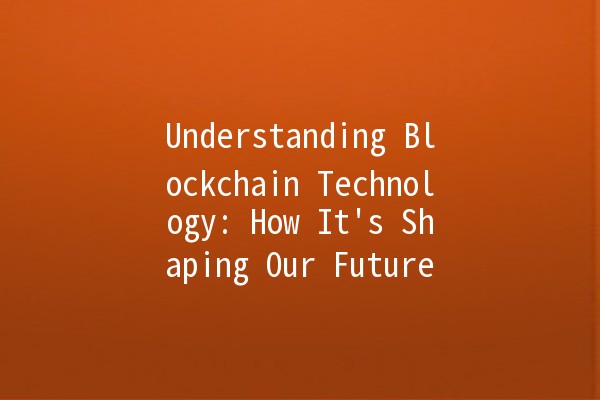
What is Blockchain?
Blockchain is a decentralized digital ledger technology that underpins cryptocurrencies and other unique data applications. It records transactions across many computers so that the record cannot be altered retroactively without the alteration of all subsequent blocks and the consensus of the network. This technology provides transparency, security, and the potential for innovative applications across various industries.
Key Features of Blockchain
Decentralization: Unlike traditional databases that are managed by a central authority, blockchain distributes the data across a network of nodes. This decentralization makes it less vulnerable to data breaches.

Transparency: Every transaction on a blockchain is visible to all participants and cannot be altered. This feature enhances trust among users.
Security: Blockchain employs cryptographic techniques to secure data, making it resistant to hacking and fraud.
Immutability: Once a piece of data is recorded on the blockchain, it cannot be changed or deleted. This ensures the integrity of the data.
The Various Use Cases of Blockchain
Cryptocurrencies like Bitcoin and Ethereum are the most wellknown applications of blockchain technology. They allow for peertopeer transactions without the need for a central authority, reducing transaction costs and increasing financial accessibility.
Example: A remittance service can enable migrant workers to send money back home at lower fees and faster speeds compared to traditional banking systems.
Blockchain can enhance supply chain transparency by enabling all parties to track the movement of goods. This traceability can help reduce fraud, waste, and inefficiencies.
Example: A food retailer can track the origin of products like milk or meat, ensuring that the goods comply with health standards and reducing the risk of contamination.
Smart contracts are selfexecuting contracts with the terms of the agreement directly written into code on the blockchain. They automate various processes, increasing efficiency and trust.
Example: In real estate, a smart contract can automate the property transfer process, executing payment and title transfer without the need for intermediaries.
Blockchain can potentially enhance the security and integrity of voting systems by ensuring that each vote is recorded accurately and cannot be tampered with.
Example: In a blockchainbased voting system, each eligible voter can cast their vote securely from their mobile device, reducing the risk of voter fraud.
Blockchain can streamline identity verification processes by allowing individuals to manage their digital identities securely.
Example: Users can store and manage their identification data securely on a blockchain, presenting only necessary details for verification without exposing sensitive information.
Boosting Productivity with Blockchain Technology
Ensuring data integrity is crucial in any business environment. Blockchain's immutability assures that once data is entered, it cannot be altered.
Application: A healthcare organization can securely store patient records on a blockchain, ensuring that only authorized individuals can access and update this sensitive information.
With blockchain, every transaction is recorded transparently and can be inspected by all parties involved.
Application: In financial sectors, this transparency can facilitate trust among clients and regulators, leading to improved client satisfaction and confidence in the services offered.
By automating processes using smart contracts, businesses can eliminate manual tasks, reducing time and resources.
Application: In insurance, a smart contract can be programmed to automatically pay claims once the conditions are met, reducing the burden on customer service agents and expediting the payout process.
Decentralization fosters collaboration among various stakeholders without the need for a central authority, leading to increased efficiency.
Application: In construction projects, different contractors can access and update the project status in realtime, reducing delays and miscommunication.
By eliminating intermediaries and increasing operational efficiency, blockchain technology can lead to significant cost savings.
Application: ancial institutions can significantly reduce transaction costs by leveraging blockchain for crossborder payments, thereby offering better rates to customers.
Common Questions About Blockchain
Blockchain technology incorporates cryptographic security measures, making it highly secure. Each block is linked to the previous one, and tampering with any individual block requires altering all subsequent blocks, which is impractical.
While blockchain offers many advantages, it also faces challenges such as scalability issues, energy consumption (especially in ProofofWork systems), and regulatory uncertainties.
Though blockchain is secure, it is not completely immune to attacks. Some vulnerabilities can arise from the applications built on blockchain rather than the blockchain itself.
Blockchain can disrupt traditional business models by introducing decentralization and enabling peertopeer transactions. This can encourage competition and innovation while reducing reliance on intermediaries.
Various industries, including finance, healthcare, supply chain management, real estate, and even art, are exploring blockchain to enhance efficiency, transparency, and security.
While blockchain provides benefits in certain applications, it is not designed to replace all traditional databases. Instead, it complements existing systems where decentralization, immutability, and transparency are required.
on Blockchain's Impact
Blockchain technology is undeniably changing the way we transmit information and conduct transactions across various sectors. It paves the way for more efficient, transparent, and secure methods of operation. The potential applications are vast, and as more entities begin to integrate blockchain solutions, we can expect to see transformative shifts in how data is managed and traded across the globe.
With its ability to enhance productivity, promote trust, and reduce costs, blockchain stands as a revolutionary technology that is set to shape the future of industries worldwide. Embracing this technology will enable businesses and individuals alike to tap into its myriad benefits, ultimately leading to a more connected and efficient world.

